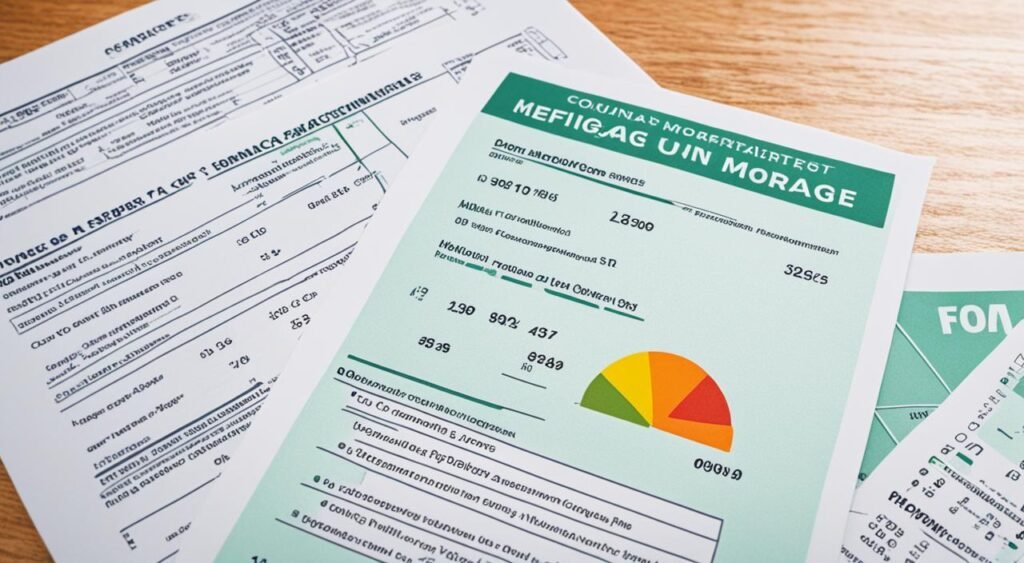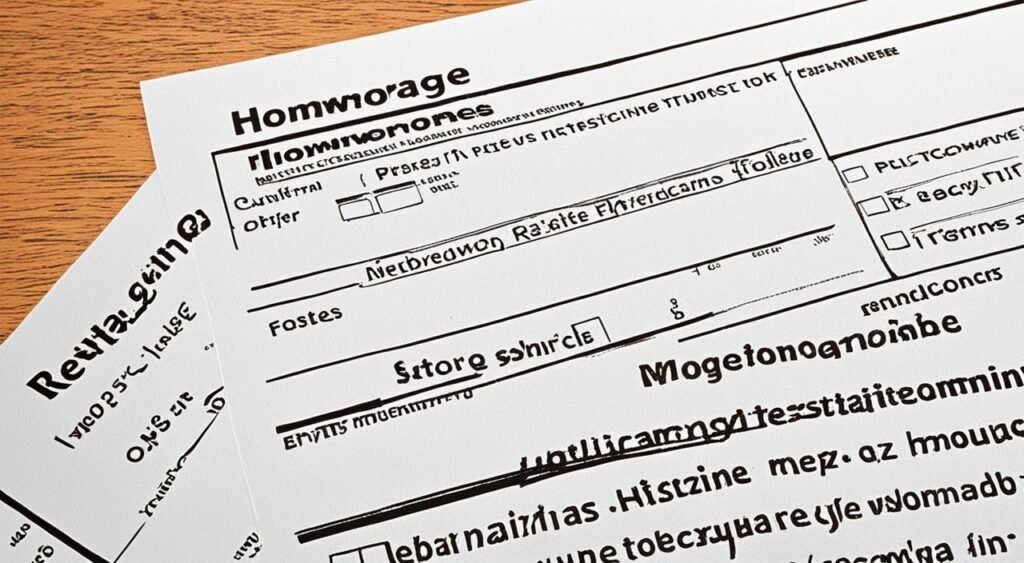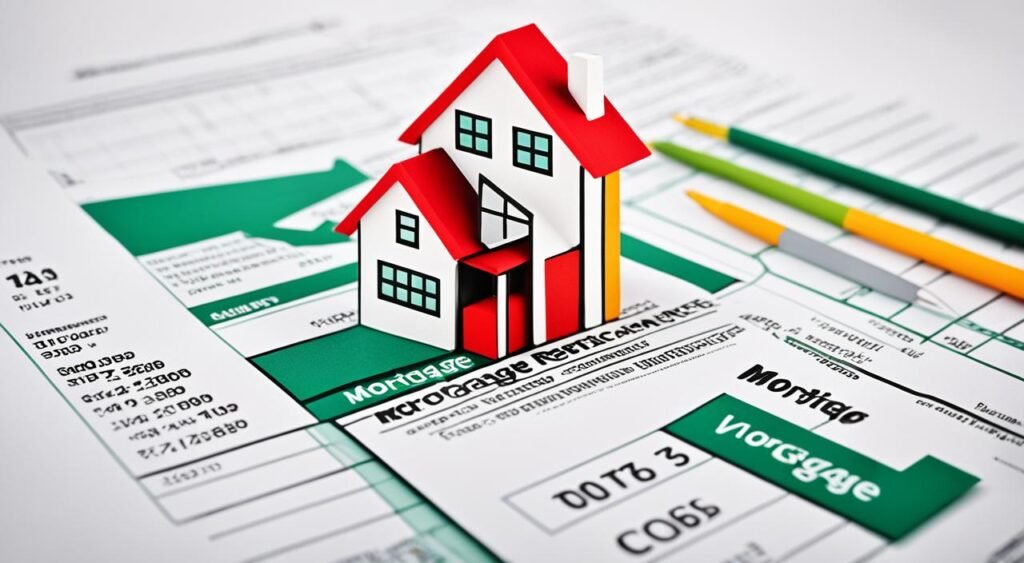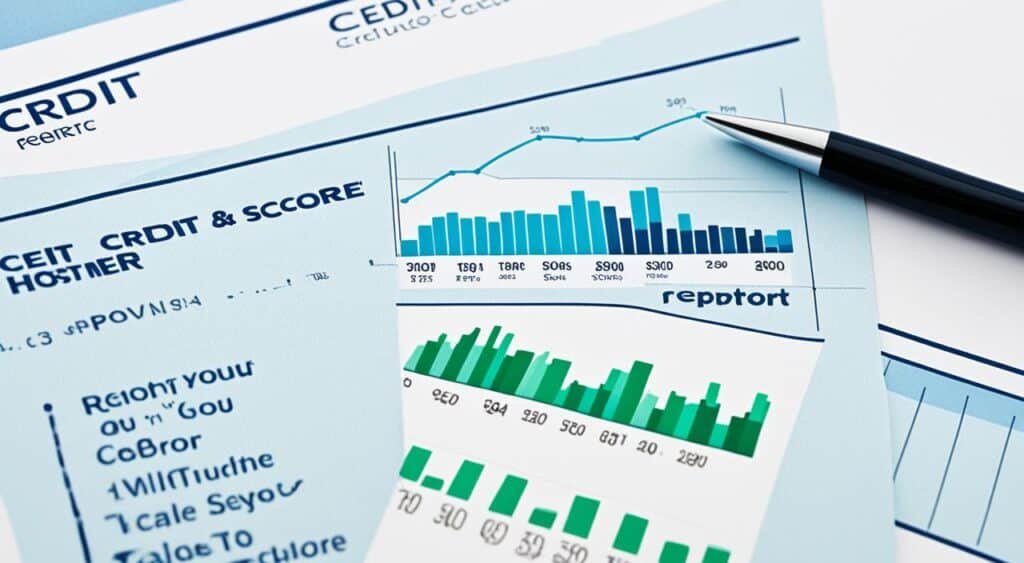Mortgage refinancing means getting a new loan to replace your current one. You might do this to get a lower interest rate, change the loan term, or use your home’s equity. It can help you save money, pay off debt, or use your property’s value. Knowing how mortgage refinancing works helps homeowners decide if it’s right for them.
Key Takeaways
- Mortgage refinancing involves replacing your existing mortgage with a new loan, which can be done to lower your interest rate, change your loan term, or access home equity.
- The refinancing process is similar to getting a new mortgage, including a credit check, financial review, and home appraisal.
- There are different types of refinancing, such as rate-and-term, cash-out, and cash-in, each with their own benefits and considerations.
- Refinancing can potentially save you money on interest and monthly payments, but it also comes with associated costs that must be evaluated.
- Timing is important when deciding to refinance, as factors like your credit score, current interest rates, and home equity can impact the potential benefits.
What Is Mortgage Refinancing?
Mortgage refinancing means you swap your current mortgage for a new mortgage. This lets you change the interest rate, loan term, or both. You might also switch to a different lender or loan type.
Replacing Your Current Mortgage with a New One
Refinancing means getting a new loan to pay off your old one. This lets you get new terms that might be better for your money situation and goals.
Adjusting Rate, Term, or Both
- Refinancing can lower your interest rate, making your monthly payments smaller.
- You might also change the loan term, making it shorter or longer.
- Some people refinance to lower their rate and change the loan term at the same time.
Changing Loan Type or Lender
Refinancing can let you switch to a different loan type, like from an adjustable-rate to a fixed-rate loan. You might also choose a new lender for better terms or service.
“Refinancing your mortgage can be a smart move to improve your finances. But, make sure to think about the costs and benefits before you decide.”
How Does Refinancing a Mortgage Work?

Refinancing a mortgage is similar to getting a new home loan. You’ll need to apply with a lender. They’ll look at your refinance process, including your credit check, financial review, and a home appraisal. This helps them figure out the loan terms you can get.
Applying Like a New Mortgage
The refinancing process begins with a loan application to your chosen lender. You’ll need to share details about your income, assets, job, and the property you’re refinancing. The lender checks your finances to see if you qualify for the loan.
Undergoing Credit Check and Financial Review
The lender will do a credit check to look at your credit history and score. They’ll also review your financial review. This means they’ll check your income, debt, and financial situation to make sure you can handle the new mortgage payments.
Getting a New Appraisal
Along with the credit and financial review, the lender will get a new home appraisal. This appraisal finds out what your property is worth today. It’s key in the refinancing decision, helping the lender figure out the loan-to-value ratio for the new mortgage.
| Key Refinancing Steps | Description |
|---|---|
| Loan Application | Submitting a loan application to your chosen lender, providing information about your income, assets, employment, and the property you’re refinancing. |
| Credit Check | The lender will review your credit history and score to assess your creditworthiness. |
| Financial Review | The lender will examine your income, debt, and overall financial situation to ensure you can afford the new mortgage payments. |
| Home Appraisal | The lender will order a new appraisal to determine the current value of your property, which is a crucial factor in the refinancing decision. |
Types of Mortgage Refinancing

Refinancing your mortgage comes in different forms, each with its own benefits. Knowing the types can help you pick the best one for your financial goals and needs.
Rate-and-Term Refinance
A rate-and-term refinance lets you swap your current mortgage for a new one. This new loan often has a lower interest rate and/or a different term. It can save you money each month and reduce the total interest paid over time.
Cash-Out Refinance
A cash-out refinance means borrowing more than you owe on your home and getting the extra cash. It’s great for homeowners who want to use their home equity for improvements, to pay off debt, or for other financial needs.
Cash-In Refinance
A cash-in refinance is the opposite of cash-out. Here, you pay a lump sum to lower your loan-to-value (LTV) ratio. This can lead to a lower interest rate and better loan terms.
It’s crucial to think about the costs and benefits of refinancing before deciding. Talking to a mortgage expert can help you find the best option for your situation.
“Refinancing can be a powerful tool to improve your financial situation, but it’s essential to understand the different options and how they may impact your long-term goals.”
Reasons to Refinance Your Mortgage
Refinancing your mortgage can bring many benefits. A key reason is to lower the interest rate and monthly payment on your loan. This can save you thousands over the mortgage’s life.
Another reason is to switch from an adjustable-rate mortgage (ARM) to a fixed-rate mortgage. This makes your finances more stable. Your interest rate and monthly payment stay the same for the loan’s life.
Shortening or Lengthening Loan Term
Refinancing lets you adjust the loan term. You can pay off the mortgage faster or lower monthly payments. This is useful if your finances have changed and you need a new budget.
Tapping Into Home Equity
A cash-out refinance lets you use your home’s equity. You can use it for home improvements, paying off debt, or other goals. It’s a smart way to use your most valuable asset.
Deciding to refinance should match your financial needs and goals. Think about the benefits to see if it’s right for you.
“Refinancing can be a powerful tool to achieve your financial objectives, but it’s important to weigh the costs and potential savings carefully.”
Mortgage Refinancing Process

Refinancing your mortgage can save you money and match your home loan with your financial goals. It involves several steps homeowners should think about carefully.
Assessing Your Situation
The first step is to assess your financial situation. Look at your credit score, home equity, and debt. Knowing where you stand financially helps decide if refinancing is right for you and what options you have.
Shopping Around with Multiple Lenders
After checking your finances, start shopping around with multiple lenders. Compare rates, terms, and costs to find the best deal for you. This helps you choose wisely from your refinancing options.
Running the Numbers for Costs vs. Savings
After getting quotes, run the numbers to see costs vs. savings. Think about closing costs, interest rates, and loan length. This will show you how refinancing affects your payments and finances over time.
Submitting Application and Documentation
If refinancing looks good, it’s time to submit your loan application and documents. You’ll need to provide financial statements, pay stubs, tax returns, and more. Lenders use these to check if you’re a good candidate and if your home’s value is right.
Attending Loan Closing
After approval, you’ll go to the loan closing. Here, you sign papers, transfer funds, and start your new mortgage.
By going through these steps, homeowners can decide if refinancing fits their financial plans and goals.
Mortgage Refinancing Costs

Refinancing your mortgage is more than getting a new loan with better terms. It comes with upfront costs you should think about before you start. Knowing these costs helps you see if the savings are worth it.
Closing Costs and Fees
Refinancing brings closing costs, which are usually 2% to 5% of the loan’s total. These include things like appraisal fees, origination charges, title insurance, and more. Make sure to look at the Loan Estimate from your lender to see what these costs add up to.
Prepayment Penalties
If your current mortgage has a prepayment penalty, refinancing might cost you more. These penalties can be a few hundred dollars or even thousands, based on your current mortgage’s terms. Always check for these penalties before you decide to refinance.
Break-Even Point Analysis
To see if refinancing is a good deal, figure out the break-even point. This is when the savings from the new loan cover the refinancing costs. Knowing this helps you understand how long you need to stay in the home to get back what you spent upfront.
| Refinancing Cost | Estimated Range |
|---|---|
| Closing Costs | 2% – 5% of Loan Amount |
| Prepayment Penalties | Varies by Existing Mortgage Terms |
| Break-Even Point | Depends on Savings and Costs |
Understanding the costs of refinancing helps you decide if it’s right for you. Take your time to review the details and do the math. This way, you can make sure you’re choosing the best option for your financial future.
Pros and Cons of Refinancing

Refinancing your mortgage can be a smart move, with both benefits and drawbacks. Knowing the pros and cons helps you decide if it fits your financial goals.
Potential Savings on Interest and Monthly Payment
Many homeowners refinance to save on interest savings and monthly payment savings. If rates are lower now than your current mortgage rate, refinancing can save you a lot over time. It reduces the total interest you pay.
Ability to Tap Home Equity
A cash-out refinance lets you use your home equity for cash. This cash can be for home improvements, paying off debt, or other big expenses. It’s great if you want to use your home’s value to your advantage.
Possibility of Lengthening Loan Term
Refinancing might lower your monthly payments, but it could also extend your loan term. This means you might pay more interest over the loan’s life. Think about this if you’re close to finishing your current mortgage.
Deciding to refinance means looking at your finances, goals, and the costs and benefits. Weighing these factors helps you see if refinancing is right for you.
Credit Impact of Refinancing
Refinancing your mortgage can change your credit score a lot. It’s important to know how it might affect you. This way, you can make a smart choice for your money.
Hard Credit Inquiries
Applying for a refinance means the lender will check your credit. This can lower your score for a bit. It looks like you’re looking for more credit, which lenders see as riskier.
But, this effect doesn’t last long. Your score will get better over time.
Changes to Credit History Length
Getting a new mortgage can change how long you’ve had credit. How long you’ve had credit is key to your score. A longer history means you’re seen as more reliable.
This could make your score go down a bit. But, it’s not a big deal.
Missed Payments During Process
Don’t miss any payments while refinancing. Missing payments hurts your score a lot. These mistakes can stay on your report for up to seven years.
Make sure you pay your mortgage on time. This keeps your credit strong.
Knowing how refinancing affects your credit helps you make better choices. Talking to a financial advisor or mortgage expert is a good idea. They can guide you to make the best decision for your future.
When to Refinance Your Mortgage

Deciding when to refinance your mortgage is a smart move. Look for signs like a better credit score, lower market interest rates, and the chance to use your home equity.
Improved Credit Score
If your credit score has gotten better since you got your mortgage, you might qualify for better rates. Lenders give better deals to people with higher scores. This could save you a lot over the loan’s life.
Lower Market Interest Rates
When market interest rates go down, refinancing is a good idea. Switching to a new loan at a lower rate can cut your monthly payments and the total interest paid.
Need to Tap Home Equity
Homeowners might refinance to use the equity in their property. This is good for home fixes, paying off debt, or other financial plans. A cash-out refinance lets you take money from your home’s value at a possibly lower interest rate.
By looking at these factors, homeowners can find the best time to refinance. This could lead to big financial gains over time.
Preparing for the Refinance

Before you start the mortgage refinance process, make sure you’re well-prepared. This means checking your credit reports, figuring out your home’s equity, and collecting all your financial documents. Doing these steps early can make the application and underwriting process smoother and faster.
Reviewing Credit Reports
First, look over your credit reports from Experian, Equifax, and TransUnion. Check for any mistakes on your credit report and fix them if you find any. This ensures your credit score is accurate, which is important for refinancing.
Calculating Home Equity
Then, find out how much your home is worth and what’s left of your home equity. This is key for figuring out your loan-to-value (LTV) ratio, which lenders look at closely. You can get a professional appraisal or use online tools to estimate your home’s value.
Gathering Financial Documentation
- Collect your most recent pay stubs or income statements to verify your current earnings.
- Gather your tax returns from the past two years to demonstrate your long-term income stability.
- Provide recent bank statements and investment account statements to showcase your financial documentation.
- If you have any outstanding debts, such as credit cards or personal loans, gather those statements as well.
Having all this info ready will make refinancing easier and more likely to succeed.
“Preparation is the key to a successful mortgage refinance. By taking the time to review your credit, calculate your home equity, and gather your financial documentation, you’ll be well on your way to securing the best possible refinancing terms.”
Also Read: What Are The Different Types Of Mortgages ?
Conclusion
Mortgage refinancing is a great way for homeowners to improve their finances. It lets them understand the refinancing process and look at different options. This way, they can make choices that fit their financial goals.
Homeowners can lower their interest rates, change loan terms, or use their home equity. The mortgage refinancing process gives them the chance to adjust to new financial situations.
The refinancing process requires looking at your finances closely. You need to compare offers from different lenders and think about the costs and savings. By doing this, homeowners can find ways to better their financial health and reach their goals.
Mortgage refinancing is a powerful tool for homeowners. It helps them manage their money better and use their home equity wisely. By getting to know the process well and looking at the benefits, homeowners can make smart choices for the future.
FAQs
Q: What is mortgage refinancing?
A: Mortgage refinancing is the process of replacing your existing mortgage loan with a new one, typically to take advantage of better terms such as a lower interest rate or monthly payment.
Q: How does mortgage refinancing work?
A: When you refinance your mortgage, you pay off your existing loan with a new one, which may have a lower interest rate or different terms. This can help you save money over the life of the loan or meet other financial goals.
Q: What are the benefits of refinancing your mortgage?
A: Some benefits of refinancing include potentially lowering your monthly mortgage payment, reducing the interest you pay over the life of the loan, accessing equity in your home, or consolidating debt.
Q: How can I get the best refinance rate?
A: To get the best refinance rate, shop around and compare offers from multiple mortgage lenders. Factors that can affect your refinance rate include your credit score, debt-to-income ratio, and the current market conditions.
Q: What is a mortgage interest rate?
A: A mortgage interest rate is the percentage of the loan amount charged by the lender for borrowing the money. It directly affects your monthly mortgage payment and the total amount of interest you pay over the life of the loan.
Q: What is the impact of refinancing on your credit score?
A: Refinancing your mortgage may have a temporary impact on your credit score, as the lender will pull your credit report during the application process. However, if you make on-time payments on your new loan, it can help improve your credit over time.
Q: When should I consider refinancing my mortgage?
A: You may consider refinancing your mortgage when interest rates are lower than your current rate, you want to change the term of your loan, or you need to access cash through your home equity.





